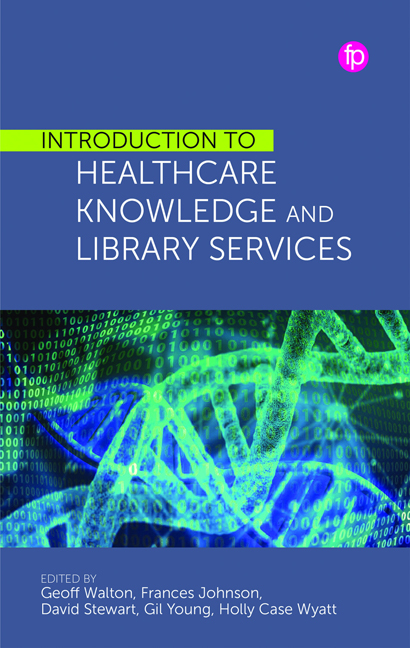Book contents
- Frontmatter
- Contents
- Figures, Tables and Case Studies
- Notes on Contributors
- Foreword
- How to Use this Book
- 1 An Introduction to Healthcare Knowledge and Library Services
- 2 Strategic Development for Healthcare Knowledge and Library Services
- 3 Exploring the Training and Development Needs of the Healthcare Knowledge and Library Services Workforce: A Case Study
- 4 Advocacy and How Knowledge and Library Specialists Tailor Services to Meet the Needs of Their Stakeholders
- 5 Mobilising Evidence and Knowledge
- 6 Internal and External Partnerships
- 7 Health Literacy, Patient Information and Combating Misinformation
- 8 Resource Discovery and Open Access
- 9 Growing the Evidence Base in Healthcare Knowledge and Library Services
- 10 Measuring Progress, Value and Impact in NHS Knowledge and Library Services
- 11 Reflective Practice in Healthcare Settings
- 12 Looking to the Future of Healthcare Knowledge Services
- Index
3 - Exploring the Training and Development Needs of the Healthcare Knowledge and Library Services Workforce: A Case Study
Published online by Cambridge University Press: 22 February 2024
- Frontmatter
- Contents
- Figures, Tables and Case Studies
- Notes on Contributors
- Foreword
- How to Use this Book
- 1 An Introduction to Healthcare Knowledge and Library Services
- 2 Strategic Development for Healthcare Knowledge and Library Services
- 3 Exploring the Training and Development Needs of the Healthcare Knowledge and Library Services Workforce: A Case Study
- 4 Advocacy and How Knowledge and Library Specialists Tailor Services to Meet the Needs of Their Stakeholders
- 5 Mobilising Evidence and Knowledge
- 6 Internal and External Partnerships
- 7 Health Literacy, Patient Information and Combating Misinformation
- 8 Resource Discovery and Open Access
- 9 Growing the Evidence Base in Healthcare Knowledge and Library Services
- 10 Measuring Progress, Value and Impact in NHS Knowledge and Library Services
- 11 Reflective Practice in Healthcare Settings
- 12 Looking to the Future of Healthcare Knowledge Services
- Index
Summary
Introduction
Most employers recognise that the workforce is the most important asset of the organisation. This is certainly true within healthcare knowledge and library services where evidence has repeatedly illustrated the economic benefit that this staff group bring to the NHS by releasing time for busy healthcare professionals (Economics by Design, 2020).
To perform efficiently and to cater for the evolving needs of healthcare, it is crucial that the workforce has opportunities to develop and expand their skills. Often, the provision of training and development are seen as an easy target when funds are short. False economies are made by cutting back on training and development opportunities that leave the workforce with less of the crucial knowledge and skills needed to help the organisation develop (Kumar, 2015, 16). By contrast, a recent European study (Dietz and Zwick, 2020, 712) found that credible training and development opportunities can increase retention rates by up to 18%.
As steward of NHS knowledge and library services in England, Health Education England (HEE) hold the remit for the provision of learning and development for the knowledge and library services workforce. This chapter outlines HEE’s approach to identifying, planning and delivering the training and development needs of the healthcare knowledge and library services workforce. Although these interventions are described in the context of HEE, the reader will note that many of the approaches are generic and may be transferrable to similar contexts elsewhere.
For the avoidance of doubt, it should be noted that this chapter focuses on exploring the needs of the knowledge and library workforce rather than the needs of service users and customers.
Establishing routes into the sector
The training and development needs of the healthcare knowledge and library services workforce begin before they take up their roles within healthcare libraries. Future members of the workforce need an awareness of the sector and an insight into the roles and types of work undertaken by healthcare knowledge and library specialists. This awareness and knowledge is essential, not least because it sparks an interest in work within healthcare and prompts applications for posts.
HEE has taken a proactive approach to promoting roles in healthcare knowledge and library services at a number of different levels.
Higher education institutions
Knowledge and library specialists working in professional roles within healthcare will often hold a CILIP accredited master’s degree in a knowledge, library and information related subject.
Information
- Type
- Chapter
- Information
- Publisher: FacetPrint publication year: 2024
